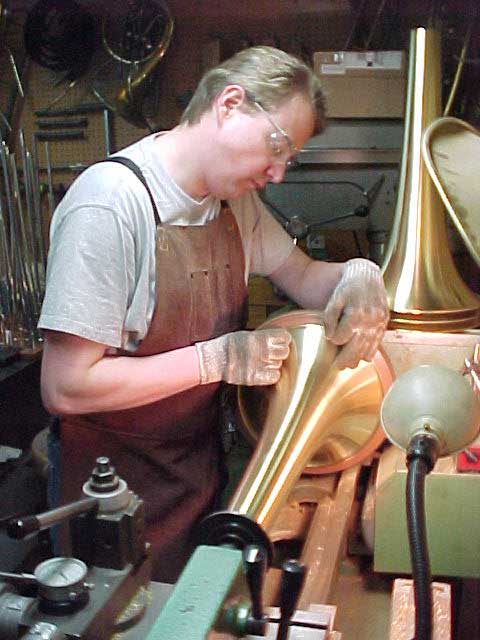Daniel C. Oberloh wrote:
Andy-
Unfortunate? I don't see a lot of slop solder here except on some of the King and Conn tubas. If your talking about doing set up on new horns, thats not really anything new and has always been a common situation, its part of the retailer's repair technician's job. I would not call that a defect, but I understand where your coming from. Minor adjustments and regulations however are part of the service that the shop is to perform on instruments arriving new from the manufacturer, its for the most part not repair.
Dan,
I see it all the time. YBB-321's with a 1/4 of the bottom bow not having solder on both parts. New Kings and Conns with terrible valves and slides. Jupiters, Blessings and other imports with badly soldered braces. I could go on. I understand that corners are cut at factories, and have no issue fixing things that break over time, but when I get a new $3,000 Buffet R-13 with a loose key on it from the factory, I get PO'ed.
Maybe so, I get to spend a lot of time fixing the mistakes of other repair shops.

Let me tell you about my day Scooter (yesterday): I got to spend about three hours on the phone (woohoo), another couple of hours straightening and cleaning filthy and bent up Bach Strad trumpets after having corrected a slightly botched silver plate job on a newly restored Yamaha trumpet for a client in Hawaii, followed with another hour in the buffing room. I had a late lunch around 5 pm, followed up with an hours packing and preparing UPS shipments. Around 8 pm I got started on a set of 5 euphoniums being restored. I addressed all the bells where I dedented, pressed smooth, belt sanded and finally spin-sanded to the point they are ready for polishing. I got home and crashed at 3 am with a back ache and ringing ears.

So much easier then working on those sloppy solders and out of alignment hand-slides don't ya think?

No sympathy here from me, sorry. You work for yourself, and you're doing what you feel is necessary to get things done. Hard work is a part of any small, privately owned business. Between doing my repairs that I still do, plus working a day job to help me out right now, I do work for my dad's electrical control business in the evenings, programming PLC controllers. We're all busy in our own way.
ASTuba wrote: "ANY technician that does any sort of repair work spends 95% of his day fixing crap that was wrong at the factory."
Daniel C. Oberloh wrote:Your post makes it sound like 95% of all the repair being done is correcting factory flaws. That from my extensive experience is certainly not the case. It also makes no sense as a retailer to deal in such instruments as it pretty much kills the idea of making a profit for the retail department if your just giving it to the maintenance and repair division. Not the kind of outfit i would be interested in working with.
Dan, in my shop, most of what I'm doing now is specialized work. I have learned a lot of tips on how to make instruments work better. 95% of what I do on a daily basis is to try to eliminate the disturbances in the insides of brass tubing. This is usually from poorly fit joints at the factory. I don't do restorations, because my back wouldn't allow it to happen, and I learned that there really isn't a lot of money in my area in restorations.
ASTuba wrote: Are you in NAPBIRT???
Thought about it, discussed it with others but could not see any truly viable reason for doing so. Its a good ''club'' that offers a lot to those who have limited resources for information or a lack of training. For me, the Technicom four times a year and partisipation in a yearly get-together somewhere in the mid-west far away from Seattle is not much of an incentive for me to participate. I know how to repair woodwinds and have trained many others, I know how to solder, perform dent work, repair valves and hand slides, polish/buff, engrave, machining, plating, run a business.......... Maybe someday?
[/quote]
And this is where I take total offense to what you said. You are a member of the American Electroplaters and Surface Finishers Society, Inc, as you were involved in that industry correct?
Then why, as a person who owns a Band Instrument Repair Shop, wouldn't you be a member of the National Association of Professional Band Instrument Repair Technicians?
I know how to do most of the functions that allow me to be a successful and profitable repair technician, but I always strive to be the best I can be. That's why I'm a member of NAPBIRT, and I go to conferences to learn from people like Wayne Tanabe, and other truly great technicians. There are many different ways to do the same task, and if I can learn a faster, easier, better way, then I'm foolish not to listen. That way, I can make more money.
Listen, I respect you and I think you do fantastic work. When I was in Seattle, I truly wish that I could have gotten to spend some time in your shop, and see just how you repair things. But noone is perfect when it comes to this business. We're all humans. I know that I am always trying to learn more about my craft and industry.
Wishing nothing but the best,
Andy






